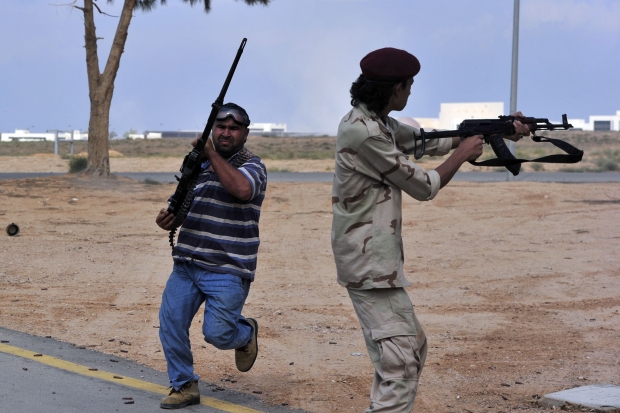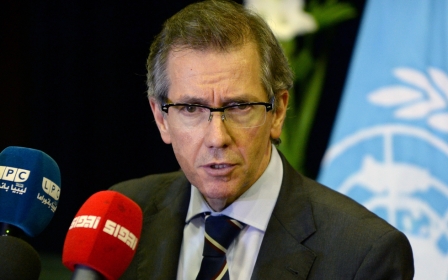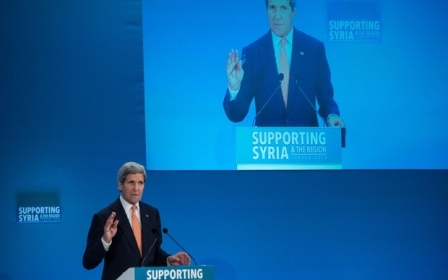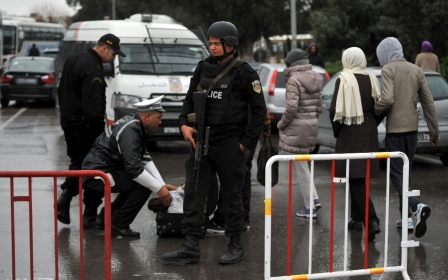Too many guns and no jobs: The battle to 'reform' Libya's fighters
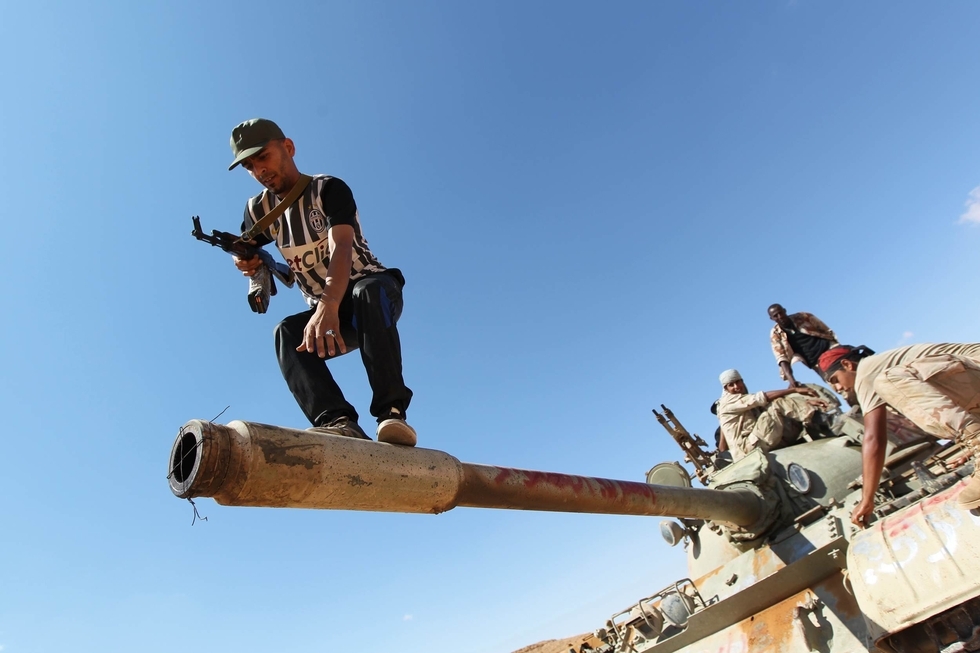
TUNIS - Staring down the barrel of a gun, Mustafa al-Sagezli thought he knew what to do. He reached over to take the gun from the man, but the man only pulled away and grew angrier.
It was at that moment that Sagezil realised the only way to solve Libya’s crisis was not to “move guns away from young men, but to move young men away from guns”.
Since then, Sagezli has been leading a drive to retrain Libyan militiamen and get them back into normal society.
His organisation, first dubbed the Warriors Affairs Commission and later renamed The Libyan Programme for Reintegration & Development (LPRD), says it has interviewed and vetted 162,000 militia members who were willing to put down their arms for a chance to live normal lives.
Many got security jobs or joined the police and army, although ex-militiamen have gone on to become IT technicians, NGO workers and students.
But as Libya marks the fifth anniversary of the uprising against Muammar Gaddafi, challenges are mounting; the guns have yet to fall quiet, and setbacks have left Sagezli feeling that hard work remains to be done.
As the country rose up against Gaddafi’s 42-year-long rule, Sagezli, like many other Libyans, traded in his day job for a gun.
At first, he used his skills as a computer engineer at Hewlett Packard to improve opposition communication systems. As the conflict grew worse, he commanded a force defending Benghazi.
Breaking the mentality
These days Sagezli sports a smart suit and neat greying moustache, but he said that his fighting days were critical and helped him understand the mentality of militants.
“I know what it is to become a militant,” Sagezli told Middle East Eye in Tunis. “And I know how hard it is to let go of weapons.”
After Gaddafi was deposed and his country started on the path toward free governance, Sagezli decided that laying down his gun and helping others do the same was the best way to help the revolution.
Sagezli said results were encouraging after the LPRD was set up in 2012.
The then-government promised funding, while the international community was quick to pour in money and resources to try to get post-Gaddafi Libya back on track.
For a while, Libya looked like it would blossom with new rights and democratic freedoms. Out of the group's database of almost 214,000 applicants, it says it has approved 162,702 participants from every region in Libya.
Early on, the LPRD was able to hire some 200 social advisers, most of whom were women, who reached out to groups of all-male fighters and tried to enrol them in the programme. "Not one case of sexual harassment was reported," Sagezli said proudly.
Those who enrolled were given access to a team of 60 psychiatrists trained in PTSD therapy and attended workshops about ethical and religious teachings which preached that democracy and the modern state were not against Islam.
One of the LPRD schemes even sent 300 former fighters to Kosovo to learn about nation-building.
Radical elements were few and far between during the revolution’s early years, Sagezli said, and even those who became radical were easily guided back toward moderation.
These programmes offered “real solutions” to counter violent militantism and to get people away from militias. Participants were given vocational training, offered marriage and housing stipends and even given “social skills” workshops.
After completing the programme, Alamin Abolmagir, a former frontline Libyan revolutionary fighter, said he became an active civil society member.
“I travelled around the country fighting, but after it ended, I realised the pen is mightier than the sword,” Abolmagir said.
Abolmagir is now a leading advocate in the movement back toward a constitutional monarchy in Libya which he said can provide a key link to tie the whole country together.
The view may be controversial, but Abolmagir said that the programme taught him to present his arguments clearly and keep a cool head under pressure without resorting to violence.
Carry a gun, get a wage
Despite the good work being done, events on the ground deteriorated as militias that refused to put down their arms grew increasingly powerful and hardline.
When Ansar al-Sharia attacked the US Libyan embassy in Benghazi and killed the ambassador Christopher Stevens in 2012, things began to unravel further.
Today, Libya is thought to have nearly 2,000 militias that many believe are truly calling the shots.
Despite progress on a reconciliation framework outlined late last year, Libya still has two rival parliaments - one in the capital Tripoli and the other in Tobruk to the east.
The Islamic State (IS) group now controls parts of Libya’s coastline and is continuing to expand.
International media is abuzz with prospects of military intervention aimed at rooting out the group, even though it remains unclear whether expanding the anti-IS front would actually defeat the group.
The economy is also defunct, with foreign investment disappearing long ago and even oil production, long Libya’s staple, now drying up due to the violence.
Unemployment is subsequently soaring and things are so bad that some commentators say that the only way to get a proper wage this day is to carry a gun at the behest of a militia or become a politician.
Few of the ex-fighters LPRD sent abroad to study - a scheme Sagezli had great hopes for – have chosen to return to a war-ravaged country which, despite its vast oil wealth, now offers few opportunities.
To make matters worse, Sagezli and LPRD have seen their domestic funding scrapped.
“The Libyan government planned to give us money, but that never came,” said Sagezli.
Despite the hurdles, the organisation is refusing to give up. It's very open about its funding and admits it receives support from organizations such as USAID and WHO
This has allowed it to keep around 1,200 men in vocational training and a further 2,000 others in some form of education, through scholarships or other kinds of support. LPRD’s foreign language programmes, helping ex-fighters to learn English, are also still running albeit at reduced capacity.
Sagezli also said he remains committed to practise an inclusive approach to reintegration and retraining.
“We see extremism not only from people holding the black flag [of IS], but also those holding the green flag [of Gaddafi’s Libya]. And we will engage with anyone who is willing to demilitarise himself,” he said.
'We could easily destroy IS'
While appealing to both sides can be a perilous task in contemporary Libya where polarisation is growing, Sagezli refuses to bow to pressure.
He dismisses repeated accusations that he is too close to the Islamists by saying that he was educated in the US and came from an open-minded family.
He has continued his work despite receiving a string of death threats that pushed him to move his family out of the country.
Sagezli said that his critics lash out at him because he is “neither afraid of Islamist politicians, nor closed off toward former Gaddafi officials,” but he insists that only through finding a common sense of unity can Libya move forward.
“If we unify ourselves and create a neutral national army, we could easily destroy IS in Libya,” he said. “Without unity, [Western] air strikes will only further radicalise the population.
“If my 19-year old son was in one of these militias deemed radical by outside forces, I wouldn’t want him killed by NATO airstrikes. I would want to de-radicalise him,” al-Sagezli added.
New MEE newsletter: Jerusalem Dispatch
Sign up to get the latest insights and analysis on Israel-Palestine, alongside Turkey Unpacked and other MEE newsletters
Middle East Eye delivers independent and unrivalled coverage and analysis of the Middle East, North Africa and beyond. To learn more about republishing this content and the associated fees, please fill out this form. More about MEE can be found here.


